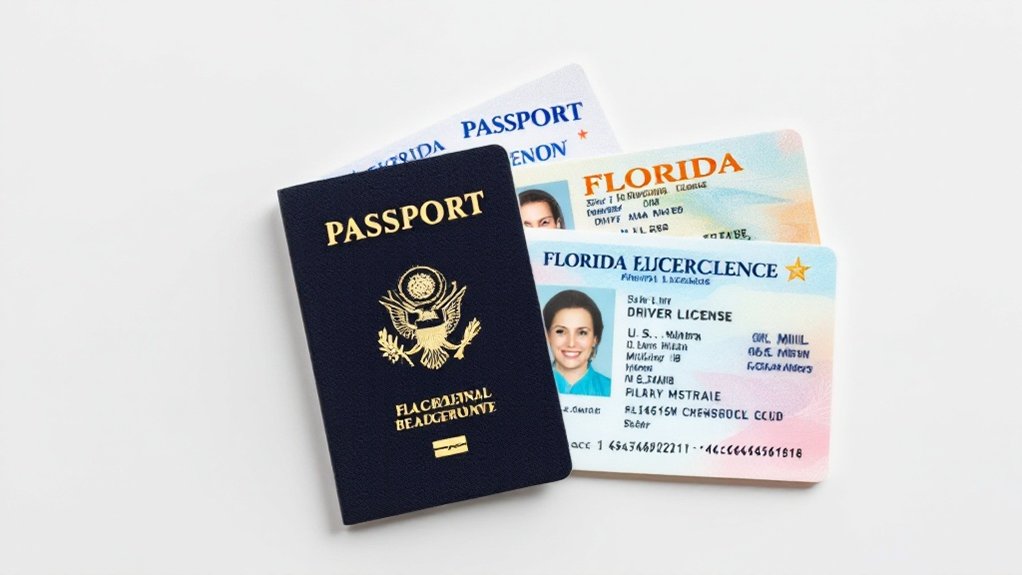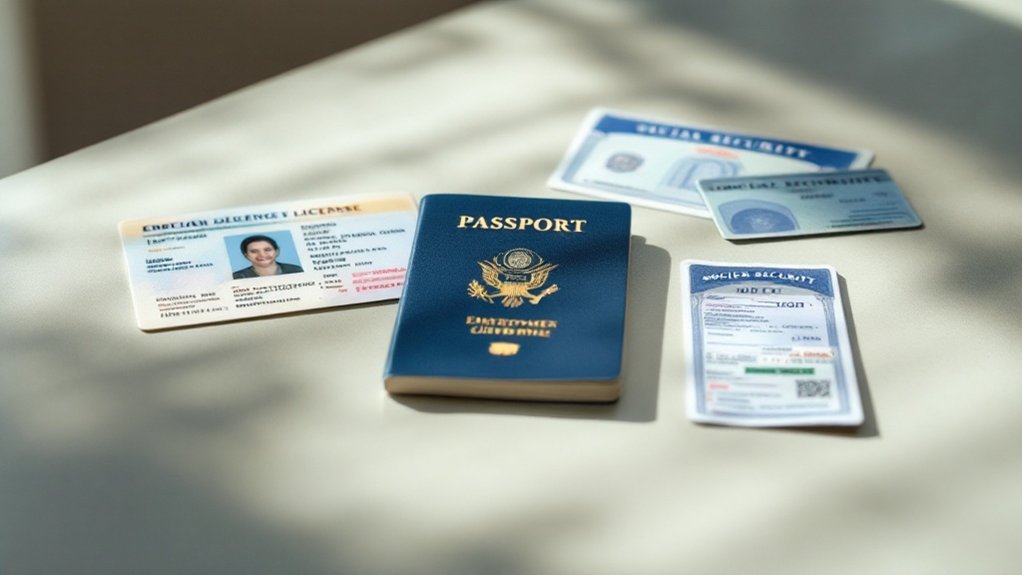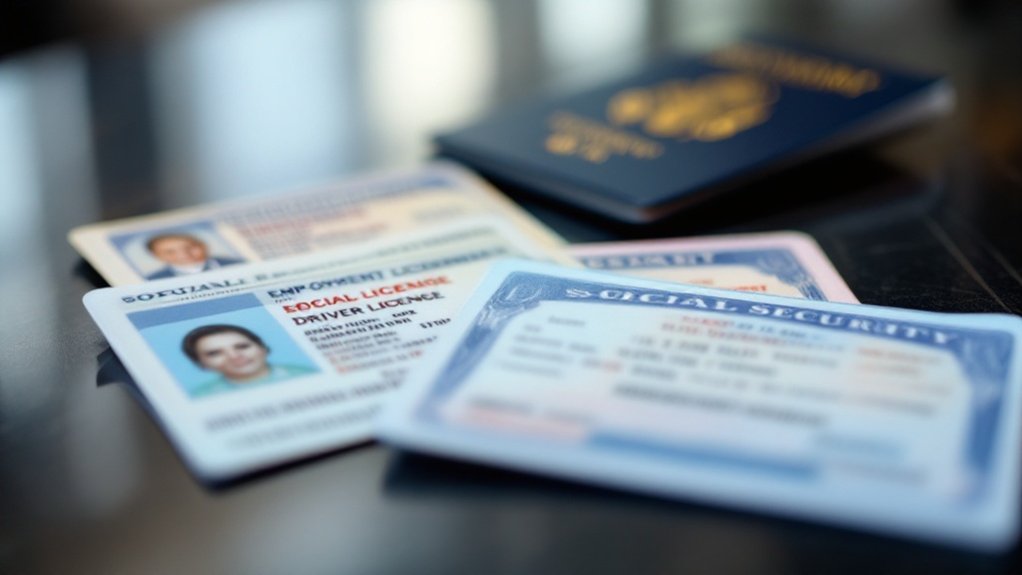When undergoing a fingerprint background check in Florida, you’ll need to present specific IDs to verify your identity. Accepted IDs include a valid driver’s license, state-issued ID card, U.S. passport, military ID, or permanent resident card. These documents guarantee accurate fingerprint processing by the Florida Department of Law Enforcement. For more detailed information on the process and requirements, you can explore further to understand how these IDs facilitate the background check process.
Primary Identification Requirements

When undergoing a fingerprint background check in Florida, you’ll need to provide a primary form of identification. Acceptable IDs include a valid U.S. passport or passport card, a state-issued driver’s license, or a state-issued non-driver identity card. Military identification cards, such as those for active duty, retirees, or reservists, are also accepted. Additionally, a Department of Defense Common Access Card can be used for identity verification.
For non-citizens, a foreign passport with appropriate immigration documents or a USCIS-issued Permanent Resident Card (I-551) can serve as primary identification. Other accepted IDs include a Uniformed Services Identification Card and a Federal Government Personal Identity Verification Card. The process of electronic fingerprinting, which involves using a scanner to capture fingerprints digitally, is essential for these background checks as it ensures accuracy and efficiency in processing the data.
Secondary Identification Options
When undergoing a Florida fingerprint background check, you will need to provide secondary identification if a primary form is not available. Secondary options include a state-issued birth certificate, a U.S. Active Duty/Retiree/Reservist Military ID Card, a current passport, and a Social Security Card. These secondary documents often require supporting documents like utility bills, voter registration cards, or vehicle registrations to verify your address and identity.
Secondary Identification Options
For fingerprinting in Florida, you’ll typically need to provide primary identification, such as a state-issued driver’s license or ID card. Secondary identification options are not explicitly listed for fingerprinting purposes in the provided information. However, in general contexts, secondary documents might include items like Social Security cards, utility bills, or vehicle registrations, which can support your identity if primary documents are not available.
When undergoing fingerprinting, guarantee you meet the specific requirements for your purpose, such as insurance licensing or employment eligibility. IdentoGO by Idemia is the designated vendor for Florida fingerprinting services, offering LiveScan and fingerprint card options.
Birth Certificates
In the context of fingerprint background checks in Florida, birth certificates serve as secondary identification options. They are used to support primary identification documents, such as a state-issued driver’s license or U.S. passport. When using a birth certificate, guarantee it is a state or government-issued document.
- Birth Certificate: A state or government-issued certificate of birth.
- Social Security Card: Used to verify your social security number.
- Marriage Certificate: Government-issued marriage certificates are accepted.
- Certificate of Citizenship: Documents like N-560 are recognized as secondary IDs.
For fingerprinting services, it is essential to have at least one primary and one address ID, ensuring that all documents match your current name and date of birth, and that the address document contains a valid U.S. address with a utility bill.
Utility Bills
Utility bills are widely accepted as secondary identification documents in Florida, particularly for purposes like background checks. They serve as proof of address, which is essential for verifying your current residential status. Common types include electricity, water, and gas bills. For a utility bill to be valid, it must display your name and current address, and this address must match the one on your primary identification.
When using a utility bill, make certain it is recent and includes all necessary information. This document complements your primary ID, such as a driver’s license, which is required for fingerprinting processes like those involving LiveScan technology in Florida.
Supporting Documents for Verification

When verifying your identity for a Florida fingerprint background check, you’ll need to provide supporting documents to confirm your address and other details. You can use a utility bill, which shows your current address, or a paycheck stub, which includes both your name and address. Additionally, a bank statement or vehicle registration/title can serve as further verification of your identity and residency.
Supporting Documents for Verification
To verify your identity for a Florida fingerprint background check, you’ll need to gather specific supporting documents. These documents help confirm your identity and address, which are essential for the process.
- Voter Registration Card: Used as a supporting document for verification.
- Vehicle Registration/Title: Provides proof of identity and address.
- Paycheck Stub: Includes name and current address for verification.
- Utility Bills: Recent bills can serve as proof of residence.
In addition to these documents, it’s crucial to understand that FDLE fingerprinting is a mandatory process for various purposes, including employment and licensure, which involves a criminal background check to ensure public safety. Ensure these documents are valid and match the information you provide during the fingerprinting process.
Utility Bills
As you prepare for a Florida fingerprint background check, you’ll need to gather specific documents to verify your identity and address. Utility bills serve as supporting documents to confirm your address. They must include your name and current address to be valid. Utility bills are considered secondary forms of identification and are not primary ID documents but can support other forms of ID.
In the context of Livescan fingerprinting, utility bills are part of the secondary list of identification documents. They are widely accepted as proof of address, alongside other documents like bank statements and lease agreements. Guarantee that your utility bills are recent and accurately reflect your current address.
Pay Stubs
Pay stubs serve as valuable supporting documents in the context of Florida fingerprint background checks. They help verify an individual’s employment status and address, which is essential for ensuring accurate documentation. Pay stubs often contain sensitive information like employee ID numbers and salary details, making them important for identity verification.
- Proof of Employment: Pay stubs serve as proof of employment and income.
- Verification Tool: They can be used to verify an individual’s employment status and address.
- Sensitive Information: Pay stubs contain sensitive details such as salary and employee ID numbers.
- Supporting Documentation: Pay stubs can support secondary IDs during the fingerprinting process.
Fingerprinting Process Overview
In Florida, the fingerprinting process for background checks involves two primary methods: electronic fingerprinting using Livescan technology and the traditional ink-and-paper method. Livescan is faster and reduces the occurrence of illegible prints, making it a preferred choice for many. Fingerprinting is often mandatory for most licenses, and Livescan results are processed more quickly.
After collecting fingerprints, they must be submitted through FDLE-approved providers like IdentoGO by Idemia for insurance licenses. Payment varies by provider, and results typically arrive within two to four days. The fingerprints are sent to FDLE and FBI for state and national criminal record checks, including verification of sex offender registries and employment history.
Professions Requiring Background Checks

Florida requires background checks for various professions, particularly those involving direct patient care or vulnerable populations. These checks are indispensable for ensuring safety and trust in healthcare settings. You’ll need to undergo background screening if you’re in roles like allopathic physicians or nursing professionals.
- Healthcare Professionals: Allopathic and osteopathic physicians, interns, and fellows.
- Nursing Professionals: Certified nursing assistants, licensed practical nurses, registered nurses.
- Therapy Professionals: Athletic trainers, massage therapists.
- Specialized Roles: Orthotists, prosthetists, podiatric x-ray assistants.
Employers in these fields often conduct background checks to verify an applicant’s qualifications and history, ensuring they do not have any prohibited offenses on their record.
Legal Framework for ID Verification**
When undergoing a fingerprint background check in Florida, you’ll need to guarantee that your identity is verified accurately. Although specific ID requirements aren’t detailed in the statutes, identification is generally necessary to ascertain the correct individual is being screened. You must use FDLE-approved Livescan service providers for fingerprint submission, and proper Originating Agency Identification (ORI) numbers are pivotal for sending results to the right agency.
In the process, you’ll submit your fingerprints electronically to the FDLE. While there are no specific ID requirements mentioned, using a valid form of identification is indispensable for verifying your identity during fingerprinting. This confirms that the background check is conducted for the correct person.
Conclusion
As you prepare for a Florida fingerprint background check, it’s a coincidence that the IDs you need are similar to those used in other states. You’ll need a primary ID like a driver’s license or passport. Secondary options include birth certificates or Social Security cards. Supporting documents like utility bills may be required. The fingerprinting process involves Livescan technology, often used for professions like teaching. Coincidentally, these checks align with federal standards.

